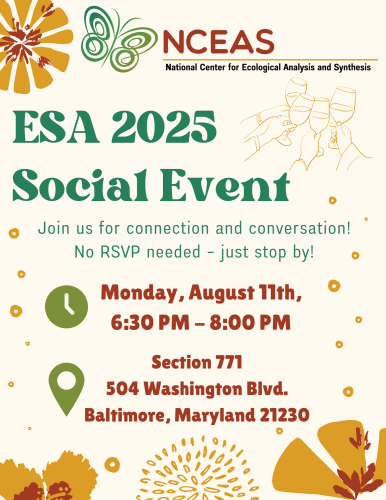

Ecology is Everywhere—and that’s why the LTER has sites located across the globe, from urban ecological systems in metropolitan areas to remote corners of Antarctica. Our sites are, as always, well represented at ESA this year, and you can see LTER talks, sessions, and workshops below.
Baltimore is home to a former LTER site, the Baltimore Ecosystem Study, which has continued their urban ecology research through other funding. They have an outsized presence at this meeting, so be sure to check out their sessions.
Be sure to stop by the LTER and EDI shared booth, #316 in the main exhibit hall!
If you don’t see your talk, submit it via the form at the button below. Remember to put LTER or Long-Term Ecological Research in the abstract, or else we won’t find it!
Sunday, August 10
ESA Short Course: Ecological Data Synthesis: A Primer on Essential Methods and Team Science. Run in collaboration with EDI and NEON!
Monday, August 11
NCEAS Social Event

Special Sessions
10:30 AM – 11:30 AM EDT
SS 10 – Time is of the Essence: Toward Meeting the Pressing Need for Paired Long-Term Sampling of Above- and Belowground Communities. Run by a new LTER SPARC Working Group!
Workshops
11:45 AM – 1:15 PM EDT
WK 04 – Data4Ecology.org — A Free Learning Platform for Facilitating Computational and Quantitative Skills in Undergraduate Ecology Courses
Posters (5:00 pm – 6:30 pm)
PS 05-087 – Evaluating microhabitat conditions favoring shrub encroachment in coastal grasslands
PS 04-069 – The role of salinity and burial in woody plant encroachment in coastal ecosystems
PS 04-064 – Tracking incidence classification changes across disturbances at Konza Prairie LTER
Oral Sessions
2:15 PM – 2:30 PM EDT
COS 013-04 – Increasing the resilience of long-term ecological research
Tuesday, August 12
Oral Sessions
8:00 AM – 8:15 AM EDT
COS 030-01 – Spatial synchrony of kelp forests: causes and consequences from populations to ecosystems
8:15 am – 8:30 am ET
COS 030-02 – Life after death: exploring how the legacies of dead foundation species influence demography of living foundation species across marine and terrestrial systems
10:15 AM – 10:30 AM EDT
COS 049-02 – Flowering phenology in a dryland ecosystem as affected by climate
12:15-12:30 PM EDF
COS 062-04 – Alternative methods for assessing belowground biomass and productivity
2:15-2:30 PM EDT
COS 062-04 – Alternative methods for assessing belowground biomass and productivity
3:30 PM – 3:45 PM EDT
COS 072-01 – Juvenile shrubs impact hydro-edaphic factors in the encroachment of coastal grassland
3:30 PM – 5:00 PM EDT
OOS 22 – Urban Long-Term Ecological Research in Baltimore: BES Lives!
COS 064-03 – Evaluating the nature of change over four decades in north-temperate lakes
COS 071-02 – Destocking of extensive livestock impacts regional primary production
COS 071-05 – Global destocking and its ecological consequences
Posters
4:00 PM – 4:15 PM EDT
COS 064-03 – Evaluating the nature of change over four decades in north-temperate lakes
5:00 PM – 6:30 PM EDT
PS 26-176 – Investigating Redox-Active Organic Matter Reduction in Alpine Wetlands
PS 26-174 – Investigating Soil Biogeochemical Cycling of High Elevation Wetlands
Wednesday, August 13
Symposia
8:00 AM – 9:30 AM EDT
SYMP 15 – Plant-Microbe Interactions in a Changing World
2:10 PM – 2:30 PM EDT
SYMP 21-03 – Microbial traits associated with carbon cycling and storage vary by elevation and the form of nutrient amendments.
3:30 PM – 5:00 PM EDT
SYMP 24 – Perspectives on the Origins and Future of Urban Ecology
Oral Sessions
1:30 PM – 1:45 PM EDT
COS 109-01 – Grazing moderates the effect of fire on tallgrass prairie after an extreme drought event
Posters
5:00 PM – 6:30 PM EDT
PS 34-098 – Assessing Evidence for Rapid Adaptation to Nitrogen Conditions in Native Plant Species
PS 28-016 – Biocrust responses to nitrogen and phosphorus enrichment along a deposition gradient in the Sonoran Desert
PS 28-017 – Changes in soil moisture and nitrogen cycle processes in the northern hardwood forest
PS 30-067 – Salvaging genetic data from decades-old degraded giant kelp tissue (Macrocystis pyrifera)
PS 27-007 – Fungal, but not bacterial, communities show strong differences across dryland transition states
PS 39-159 – How does modular hydraulic architecture of Juniperus interact with canopy dieback?
PS 29-036 – Impact of global change drivers on dryland microbes: Implications for public health and biodiversity
Special Sessions
10:00 am – 11:30 am EDT
SS 35 – Land Abandonment as a Global Change Driver: Challenges and Opportunities
Thursday, August 14
Inspire Sessions
8:00 AM – 9:30 AM EDT
INS 10-06 – Diverse Undergraduate Research Students in Ecology (DURSiE)-Building Coastal Connections
Oral Sessions
4:30 PM – 4:45 PM EDT
COS 171-05 – Leveraging long-term cover data to understand diversity maintenance in the context of global change
Friday, August 14
Short Courses:
8:00 AM – 11:00 AM EDT
SC 12 – Explore and Work with Continental-Scale Biodiversity Data Using the ecocomDP R Package: An Introduction to Analysis-Ready Data from NEON and the US LTER
Oral sessions
11:00 am
COS 150-05 – Risks of tire microplastics to pollinators using roadside habitat









